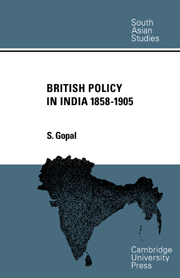Book contents
- Frontmatter
- Contents
- Preface
- Map 1 The Annexation of Burma
- Map 2 Afghanistan and Central Asia
- 1 The Aftermath of The Revolt, 1858–69
- 2 The Conservative Adventure, 1869–80
- 3 The Liberal Experiment—Ripon and Dufferin
- 4 Return to Caution, 1888–98
- 5 Curzon: The Apogee of Administration
- Conclusion
- Notes
- Bibliography
- Index
- Frontmatter
- Contents
- Preface
- Map 1 The Annexation of Burma
- Map 2 Afghanistan and Central Asia
- 1 The Aftermath of The Revolt, 1858–69
- 2 The Conservative Adventure, 1869–80
- 3 The Liberal Experiment—Ripon and Dufferin
- 4 Return to Caution, 1888–98
- 5 Curzon: The Apogee of Administration
- Conclusion
- Notes
- Bibliography
- Index
Summary
In 1858, after the suppression of the revolt in India, the British government decided to assume direct responsibility for the administration of the country. The rebels had failed to uproot British rule in India but they had succeeded in drawing attention to the anomaly of the East India Company governing an empire. The assumption of authority by the Crown marked, of course, no sharp cleavage in India's history. Many of the principles and methods which became prominent in the years after 1858 had been considered and formulated by the servants of the Company. Nor was there much replacement of personnel. But the fact that the British government and Parliament had accepted responsibility for India, for the proper administration of the country and for the betterment of her people, was in itself of significance.
It demanded, in the first place, that the two political parties in Britain should give thought to India and to the objectives of British rule; for the British government had now to make policy for India. It is true that, in the years after 1858, the emphasis was on administration. The machinery of government was organized, a corpus of statute was built and the civil service was strengthened. But these were no inanimate tasks. They were inspired by certain ideas; and in turn they set afoot certain forces. Education, encouraged mainly as an aspect of good administration, promoted the elements of political consciousness. After about fifty years, by the end of Lord Curzon's viceroyalty in 1905, it became clear that these new forces would dominate the scene.
- Type
- Chapter
- Information
- British Policy in India 1858-1905 , pp. ix - xPublisher: Cambridge University PressPrint publication year: 1965



